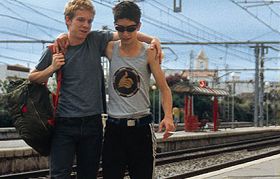
Best pals. Dani and Nico (Ramallo and Vilches) are reunited for 10 days of sun, sand and girls...
dir Cesc Gay
scr Cesc Gay, Tomas Aragay
with Fernando Ramallo, Jordi Vilches, Chisco Amado, Marieta Orozco,
Esther Nubiola, Myriam Mezieres, Ana Gracia, Mingo Rafols,
Muntsa Alcaniz, Eduardo Gonzalez, Pau Dura, Jesus Goray
release UK 3.Oct.03
winner Special Youth Award at Cannes 2000
00/Spain 1h33

See also: INTERVIEW WITH THE FILMMAKERS | IN THE CITY (2003)
 This beautifully made Spanish film has a slightly different slant on the standard coming-of-age story. The 16-year-old Dani (Ramallo) is left in his family's beach house for 10 days while his parents go on holiday elsewhere, so he invites his best friend Nico (Vilches) down from Barcelona. Soon the two are up to their old antics--wrestling, looking for girls, hunting and fishing, and indulging in a bit of "krampack", which is what they call their adolescent sexual experimentation. But the problem is that Dani takes this all a bit more seriously than Nico, who has his mind much more focussed on two girls (Orozco and Nubiola) they've met. What will this mean for their friendship?
This beautifully made Spanish film has a slightly different slant on the standard coming-of-age story. The 16-year-old Dani (Ramallo) is left in his family's beach house for 10 days while his parents go on holiday elsewhere, so he invites his best friend Nico (Vilches) down from Barcelona. Soon the two are up to their old antics--wrestling, looking for girls, hunting and fishing, and indulging in a bit of "krampack", which is what they call their adolescent sexual experimentation. But the problem is that Dani takes this all a bit more seriously than Nico, who has his mind much more focussed on two girls (Orozco and Nubiola) they've met. What will this mean for their friendship?The intriguing thing here is the way the two central characters struggle so honestly with their sexuality--there are no easy answers and the film avoids simplistic moralising, instead presenting the issues in a meaningful way that makes us think it through ourselves. Director-cowriter Cesc Gay handles this material with a real sensitivity, eliciting fine performances from the two young actors as they struggle with their innocence, desires and desperation. One of the subplots seems a bit too convenient--involving a gay writer (Amado) who befriends the aspiring novelist Dani--but it does add another level to the story, giving the film a slightly disturbing edge. And Nico has a bit of a surprise in store for him as well as he and his new girlfriend approach the Big Moment. All in all, this is a fine, brave little film that deserves to be seen--it will certainly touch a nerve of recognition.
| adult themes and situations, language |

| 6.Apr.01 llgff |

 R E A D E R R E V I E W S
R E A D E R R E V I E W S
Tom Hearn, USA:  "I thoroughly enjoyed it. The two young boys - Dani and Nico - expressing their eternal devotion to each other ... and in bed together." (4.Jun.04)
"I thoroughly enjoyed it. The two young boys - Dani and Nico - expressing their eternal devotion to each other ... and in bed together." (4.Jun.04)
Jesse, Canada:  "Loved that movie! it was great!" (9.Jun.04)
"Loved that movie! it was great!" (9.Jun.04)
Chris Leighton, Rhodes, Greece:  "A wonderfully moving film and so true to life. It took me back many years to my own days as a teenager, discovering my sexuality." (28.Jul.04)
"A wonderfully moving film and so true to life. It took me back many years to my own days as a teenager, discovering my sexuality." (28.Jul.04)
 I N T E R V I E W with the F I L M M A K E R S
I N T E R V I E W with the F I L M M A K E R S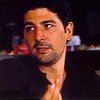 We Don’t Talk About This Kind of Thing...
We Don’t Talk About This Kind of Thing...Rich Cline talks to the guys behind a terrific film that’s taken far too long to reach British screens...
Spanish filmmaker Cesc Gay is both surprised and pleased at the reception his film Krampack has had since it premiered at the Cannes Film Festival in 2000. Over the next three years the film toured the world, picking up awards at festivals from Bogota to Bratislava, Miami to Malaga, Stockholm to Chicago, including a special youth award at Cannes.
“When we made Krampack never thought we were making a gay movie,” he says, laughing at the irony of his name. “For me the movie is about friendship. A lot of people experiment when they’re teenagers. The Italian distributor said that since we didn’t think about all that stuff while we were making it, it’s a better film as a result. It’s not typical or obvious.”
His writing partner Tomás Aragay adds, “When we were writing it, we didn’t want to commercialise it. In Spain we don’t talk about this kind of sexual experimentation. But we all experiment with our friends.”
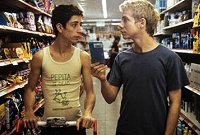 Krampack is about two 16-year-old boys who spend a summer in a Barcelona beach house while their parents are away. It’s a typical summer: exploring each other, trying to get together with girls ... and realising that one of them might prefer boys. Krampack is the code name for their experimentation; it’s a word coined by Jordi Sanchez, author of the play on which the film is based.
Krampack is about two 16-year-old boys who spend a summer in a Barcelona beach house while their parents are away. It’s a typical summer: exploring each other, trying to get together with girls ... and realising that one of them might prefer boys. Krampack is the code name for their experimentation; it’s a word coined by Jordi Sanchez, author of the play on which the film is based.
“The play was a comedy about people in their 20s living in a flat,” Cesc says. “We made them younger because people in their 20s aren’t really like that. I liked the idea of making a film about a friendship at 16 years old.”
Tomás continues the idea: “We remembered the times when we were together at that age, the atmosphere and excitement of going to stay with friends. We sent the family away so they were in a free situation, because this is a choosing time -- who to sleep with, to study or not to study. It’s a critical time.”
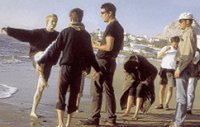 Even though Cesc and Tomás have known each other since they were teens, they insist that it’s not an autobiographical film. “Yes, it’s based on real experiences of discovering sex with friends,” Tomás says, “going to a party and getting drunk, trying to get the girl and not being able to. Everyone remembers doing this kind of thing.”
Even though Cesc and Tomás have known each other since they were teens, they insist that it’s not an autobiographical film. “Yes, it’s based on real experiences of discovering sex with friends,” Tomás says, “going to a party and getting drunk, trying to get the girl and not being able to. Everyone remembers doing this kind of thing.”
Casting two sexually curious 16-year-olds was tricky, because Cesc says all the actors who auditioned looked far too old. “I soon discovered that most teenagers are built like Mike Tyson and they've been shaving since they were 12,” he says. “So we eliminated all but 20 percent of the kids who'd come to the casting. Then we had to make sure the boys made a good match. It was sort of like mixing a cocktail. The two of them might be great individually but if they didn't work together the film just wouldn't make it. I was thinking of Redford and Newman, Lemmon and Matthau, Laurel and Hardy or Delon and Belmondo.”
They cast two very different 20-year-olds: Fernando Ramallo, who plays Dani, is a professional actor who had appeared in David Trueba’s award-winning The Good Life, while Nico is played by Jordi Vilches, a circus performer and stage actor who had never made a movie before. “Jordi just wanted to earn the money from the film so he could buy a truck and drive around the country,” Tomás says “He still does that, he does one movie a year.”
Before Krampack, Cesc made a film called Hotel Room with Argentine director Daniel Gimelberg. “I lived in New York from 1993 to 1996, and we shot the film for $10,000, which is basically no budget! We built a hotel room in my friends’ living room and shot it in black and white on 16 millimetre in 10 days.”
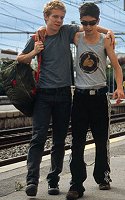 Meanwhile, producer Marta Esteban was trying to get the film version of Krampack going. She was looking for a young filmmaker from Barcelona, and when she saw Hotel Room she gave Cesc a call. He in turn brought Tomás in to work together on the script. “Marta had already commissioned four scripts before ours but we didn’t read any of them,” Cesc says. “We worked out the big changes -- a summer story, with the ages changed -- and then we wrote the screenplay for no money. We spent from February to the end of May writing. We started shooting the first week of October with a small but decent budget.”
Meanwhile, producer Marta Esteban was trying to get the film version of Krampack going. She was looking for a young filmmaker from Barcelona, and when she saw Hotel Room she gave Cesc a call. He in turn brought Tomás in to work together on the script. “Marta had already commissioned four scripts before ours but we didn’t read any of them,” Cesc says. “We worked out the big changes -- a summer story, with the ages changed -- and then we wrote the screenplay for no money. We spent from February to the end of May writing. We started shooting the first week of October with a small but decent budget.”
Both in their mid-30s, Cesc and Tomás share a love of storytelling, and their long-term friendship shows in the way they frequently finish each others’ sentences. When asked about running themes in their work together, Cesc comments on the similar sense of humour and a common tone. “It’s a mixture between tenderness...”
“...and humanity...” Tomás interjects.
“...talking about people and emotion and daily real life,” Cesc adds. “We love cop movies and thrillers, but I’m not interested in making one.” To which Tomás says, “We’re not really very spectacular!”
Cesc says his main influences are Buñuel, Cassavettes “and all the old ones”, while Tomás cites Kaurismaki and Kitano.
Cesc and Tomás have gone on to cowrite IN THE CITY, which was selected for both Toronto and London film festivals in 2003. “It’s an ensemble story about a group of people in their 30s,” Tomás says, and Cesc continues, “a group in which no one talks about what’s going on between them. And there are all kinds of things going on. It’s a little, sad movie.” To which Tomás adds, “It’s very austere.”
“Yes,” Cesc agrees. “For our next film we’re talking about a comedy. We want to have some fun.”
--London, 19.Sep.03